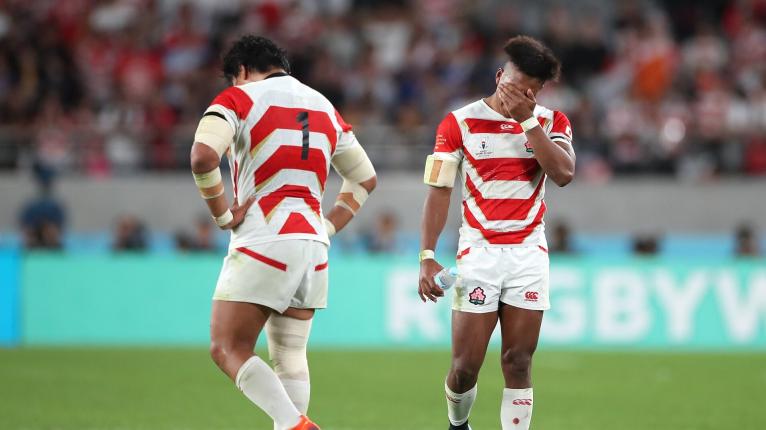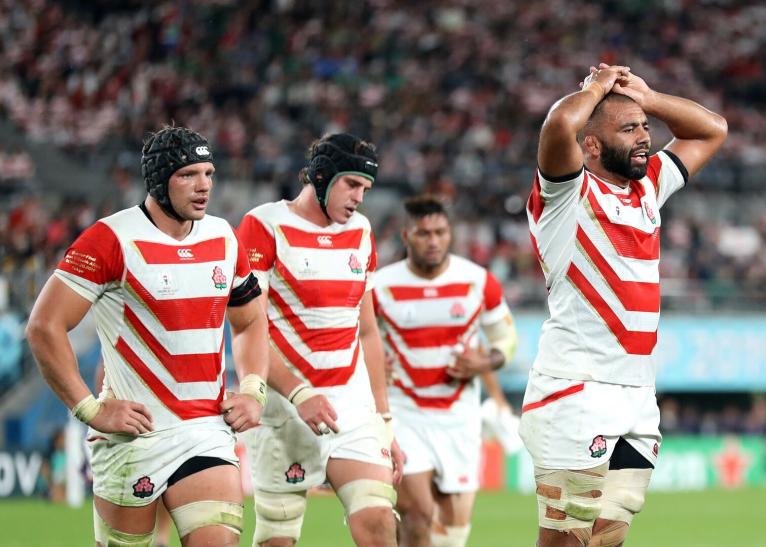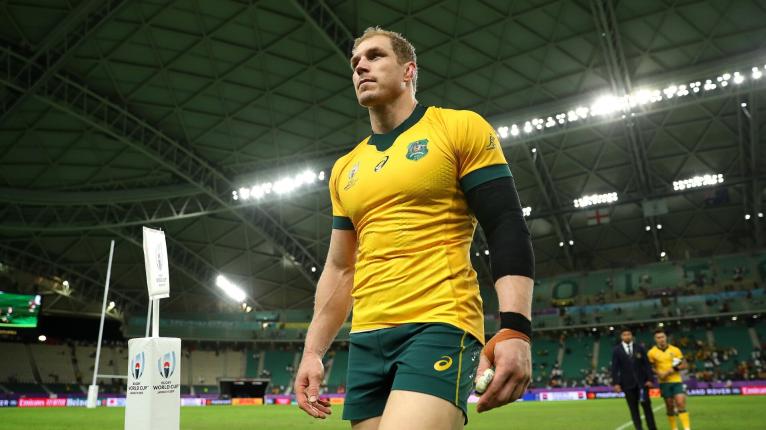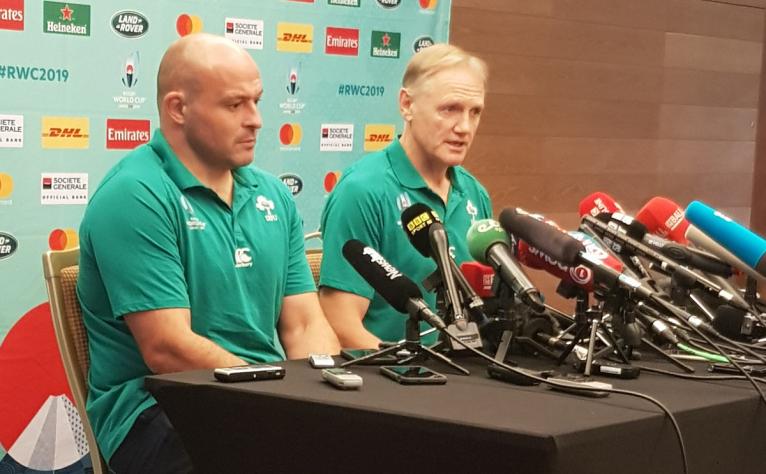It is true. For all the good that sport does, the way it can reach into the soul and nourish your nether regions, it doesn’t always give us what we want.
Our love affair with Japanese rugby was relatively simple. Its roots entwined with those of the game we cherish: respect, generous hospitality and a way of playing that allows the ball to do the work. Nothing beats nostalgia and Japan’s offloading seemed to belong to a different era; one before dominant hits and choke tackles had taken the air from the game. Ireland and Scotland had both succumbed. Japan had bobbed and weaved agonisingly out of reach, popped the ball into eager hands too swift for Gaelic grasping, and in doing so, we’d all become a little smitten.

Rugby has forever told us, it is for all shapes and sizes; where crafted technique can overcome brute strength; where a fleet-footed imp can make a towering giant look a little daft; and where, after everything, everyone gets a drink. Of late, however, the Goliaths have ruled the game. And in a way, we’ve let them. Big men have only been bested by bigger men as the sport has chased stature and not skill. The camera dipped and rose as it went along the Japanese line devotedly sobbing their anthem. This was a team of normal-shaped men who’d redefined what could be done on a rugby pitch: how could you not love them?

But love is for fools. And sport rarely suffers them. Sport adores professionalism, practice, hard work; those who reduce risk, make the right choice, punish the mistake: it is unforgiving. As were South Africa; executing a one-dimensional game plan that hammered thud after agonising thud at Japanese flanks. For a while, the Cherry Blossoms swallowed the pain; attempted to keep the wheeze going, smiling through cracked ribs at all those who still believed. But it was just a question of time. Four years of ignominy is time enough. Revenge is not just best served cold, you want to serve it up in someone’s capital city.
Speaking of ignominy and capital cities: England are requited. Forty points upon an old foe were bewitching yet seemingly unsurprising as Australia’s own unrepentant Jones dealt out defeat for the seventh time. Familiarity breeds contempt. The Wallaby wilt was almost rueful. It could prove to be Pocock’s last. A man whose impressive thighs have bestrode the game and reinvented how you make the breakdown yours. It was he who threw the loose pass that unleashed Slade, and subsequently May. I wanted something greater for him and the reborn Lealiifano. Two of rugby’s finest names in recent years. Strength on and off the field. I wanted more. Yet England sacked them short.

Short may well be Schmidt’s Irish epitaph: short of realising a World Cup final four. It will talk at length about how they beat the All Blacks twice but little about what happened in Japan. England’s Australian victory had barely cooled as New Zealand bore a knowing, toothy grin. This is an Irish team with the memory of how to be a great side but not the mode. For all their experience, there just didn’t seem enough air in the lungs. The All Blacks stuck a hand on all those famous shoulders and plunged a gasping Ireland deep. Best walked from the field shaking his head. It should not have ended like this.

And no one does endings like the French. Few do rugby like them either. Ollivon’s eighth-minute score was as sleek a try as you’ll see at this World Cup. Ntamack and Penaud have hips of yesteryear and it was all Wales could do to hold on. But hold on they did. Wainwright’s wheels and Biggar’s boot claimed ten points of their own and it was just nine points difference at the half. Yet, astonishingly, fourteen men with half an hour to go. A player with a big name, tall frame and an even larger ability to let his team down: Sebastian Vahaamahina elbowing a World Cup semi-final spectacularly out of reach. Not really what anyone wanted, save the Welsh.
And yet here we are. No upset, no romantic line, no heroic story to regale. Just the four best teams in the world and two semi-finals impossible to call.
If sport doesn’t always give us what we want, it’s because we probably don’t know what’s best for us.
This article first appeared on samrobertsrugby.com and is re-published here with permission.
RugbyPass went off the beaten track to an iconic Maid Cafe in Akihabara, Tokyo.







































Comments on RugbyPass
Had hoped you might write an article on this game, Nick. It’s a good one. Things have not gone as smoothly for ROG since beating Leinster last year at the Aviva in the CC final. LAR had the Top 14 Final won till Raymond Rhule missed a simple tackle on the excellent Ntamack, and Toulouse reaped the rewards of just staying in the fight till the death. Then the disruption of the RWC this season. LAR have not handled that well, but they were not alone, and we saw Pau heading the Top 14 table at one stage early season. I would think one of the reasons for the poor showing would have to be that the younger players coming through, and the more mature amongst the group outside the top 25/30, are not as strong as would be hoped for. I note that Romain Sazy retired at the end of last season. He had been with LAR since 2010, and was thus one of their foundation players when they were promoted to Top 14. Records show he ended up with 336 games played with LAR. That is some experience, some rock in the team. He has been replaced for the most part by Ultan Dillane. At 30, Dillane is not young, but given the chances, he may be a fair enough replacement for Sazy. But that won’be for more than a few years. I honestly know little of the pathways into the LAR setup from within France. I did read somewhere a couple of years ago that on the way up to Top 14, the club very successfully picked up players from the academies of other French teams who were not offered places by those teams. These guys were often great signings…can’t find the article right now, so can’t name any….but the Tadgh Beirne type players. So all in all, it will be interesting to see where the replacements for all the older players come from. Only Lleyd’s and Rhule from SA currently, both backs. So maybe a few SA forwards ?? By contrast, Leinster have a pretty clear line of good players coming through in the majority of positions. Props maybe a weak spot ? And they are very fleet footed and shrewd in appointing very good coaches. Or maybe it is also true that very good coaches do very well in the Leinster setup. So, Nick, I would fully concurr that “On the evidence of Saturday’s semi-final between the two clubs, the rebuild in the Bay of Biscay is going to take longer than it is on the east coast of Ireland”
6 Go to commentsWhat was the excuse for the other knockout blowouts then? Does the result not prove the Saints were just so much better? Wise call to put your eggs in one basket when you’ve got 2 comps simultaneously finishing.
28 Go to commentsReally hope Kuruvoli and his partner rock the Canes.
1 Go to commentsI wonder what impact Samson has had on their attack, as the team seems less prone to trundle it up the middle, take the tackle and then trundle it up again. I lost faith in the coach last year as the Rebelss looked like a 2nd/3rd rate South African team. I also disliked Gordon standing back, often ignored as the forward battle went on and on. Maybe its our Aussie way of not getting off our A***’s until the enemy is at the gate.
83 Go to commentsThanks for the write up. Great to see the Rebs winning, I am a little interested in how they will go against the remaining kiwi teams, I think they’ve only played Hurricanes and Highlanders but how great to see these players performing!! I also see Parling has a job beyond June 30! A good move by RA? Also how do you fix the Rebels previously scratchy defence?
83 Go to commentsbe smart - go black
13 Go to commentsNext week the Crusaders hopefully have Scott Barrett back. Will be great to have the captain back. Hopefully he will be the All Black captain as well.
12 Go to commentsExciting place to be for the young fella. I expected he was French Polynesian when I saw him included in the France 6N squad (after seeing him in NZs), and therefor be strong grounds we might loose him to rugby down here. Good, in that he is good enough to warrant such a profile, and from a journalism’s fan interaction aspect, to finally get a back ground story on the fella. Hope he has settled into NZ OK and that at least one rugby country will fit with him to help his development, which, if so, he should surely continue for a few years, and then that he can experience France to it’s fullest with a bit more maturity and less reliance on family than you would have at his current age. A good 3 or 4 years before he would be ready for International duty if he wanted to wait. Of course he already sounds good enough to accept a call up, and to cap himself, in the more immediate future (he’d have to be very very good in the case of the ABs), and he’ll get a great taste of that being with the Canes who have a bunch who are just a few years further into their career and looking likely Internationals themselves.
13 Go to commentsI remember towards the end of the original broadcasting deal for Super rugby with Newscorp that there was talk about the competition expanding to improve negotiations for more money - more content, more cash. Professional rugby was still in its infancy then and I held an opposing view that if Super rugby was a truly valuable competition then it should attract more broadcasters to bid for the rights, thereby increasing the value without needing to add more teams and games. Unfortunately since the game turned professional, the tension between club, talent and country has only grown further. I would argue we’re already at a point in time where the present is the future. The only international competitions that matter are 6N, RC and RWC. The inter-hemisphere tours are only developmental for those competitions. The games that increasingly matter more to fans, sponsors and broadcasters are between the clubs. Particularly for European fans, there are multiple competitions to follow your teams fortunes every week. SA is not Europe but competes in a single continental competition, so the travel component will always be an impediment. It was worse in the bloated days of Super rugby when teams traversed between four continents - Africa, America, Asia and Australia. The percentage of players who represent their country is less than 5% of the professional player base, so the sense of sacrifice isn’t as strong a motivation for the rest who are more focused on playing professional rugby and earning as much from their body as they can. Rugby like cricket created the conundrum it’s constantly fighting a losing battle with.
4 Go to commentsOh wow… “But as La Rochelle proved in winning in Cape Town this season, a cross-continental away assignment need not spell the end of days.” La Rochelle actually proved quite the opposite. After traveling to Cape town and back they (back-to-back and current champs) got mercilessly thumped the next week. If travel is not the reason, why else would a full-strength powerhouse like La Rochelle get dumped on their @r$e$ one week later?
28 Go to commentsYou know he can land a winning conversion after the full time siren is up. (Even if it takes two attempts.)
5 Go to commentsA very insightful article from Jake. I would love to know how South African’s feel about their move to Europe. Do you prefer playing in Europe or want to go back to Super Rugby?
4 Go to commentspure fire
1 Go to commentsA very well thought out summary of all the relevant complications…agree with your ”refer the Cricket Test versus 20/20 comparison”. More also definitely doesn't necessarily mean better!
4 Go to commentsMust be something when you are only 19 y.o and both NZ and France want you. Btw he wasn’t the only new caledonian in french U20 as Robin Couly also lived in Noumea until 17. Hope he’s successful wherever he chooses to play.
13 Go to comments“Several key players in the Stade Rochelais squad are in their thirties” South Africans are going to hate the implications of that comment!
6 Go to commentsI know Leinster did a job on La Roche but shortly after HT Leinster were 30-13 ahead of them and at a similar time Toulouse were trailing Exeter. At 60 mins Leinster were 27 ahead but after 67 mins Toulouse were only 19 ahead before Exeter collapsed. That’s heavier scoring by Leinster against the Champions. I think people are looking at Toulouses total a little too much. I also think Northhampton are in with a real chance, albeit I’d put Leinster as favourites. If Leinster make the final I expect them to win by more than ten and with control.
6 Go to commentsHey Nick, your match analysis is decent but the top and tail not so much, a bit more random. For a start there’s a seismic difference in regenerating any club side over a test team. EJ pretty much had to urinate with the appendage he’d been given at test level whereas club success is impacted hugely by the budget. Look no further than Boudjellal’s Toulon project for a perfect example. The set ups at La Rochelle and Leinster are like chalk and cheese and you are correct that Leinster are ahead. Leinster are not just slightly ahead though, they are light years ahead on their plans, with the next gen champions cup team already blooded, seasoned and developing at speed from their time manning the fort in the URC while the cream play CC and tests. They have engineered a strong talent conveyor belt into their system, supported by private money funnelled into a couple of Leinster private schools. The really smart move from Leinster and the IRFU however is maximising the Irish Revenue tax breaks (tax relief on the best 10 years earnings refunded at retirement) to help keep all of their stars in Ireland and happy, while simultaneously funding marquee players consistently. And of course Barrett is the latest example. But in no way is he a “replacement for Henshaw”, he’s only there for one season!!! As for Rob Baxter, the best advice you can give him is to start lobbying Parliament and HMRC for a similar state subsidy, but don’t hold your breath… One thing Cullen has been very smart with is his coaching team. Very quickly he realised his need to supplement his skills, there was talk of him exiting after his first couple of years but he was extremely shrewd bringing in Lancaster and now Nienaber. That has worked superbly and added a layer that really has made a tangible difference. Apart from that you were bang on the money… 😉😂
6 Go to commentsNot sure exactly what went wrong for him at Glasgow but it’s pretty clear he ain’t Franco’s cup of tea. Suspect he would have been better served heading out of Scotland around the same time as Finn, Hoggy and Jonny!
1 Go to commentsBulls disrespected the Northampton supporters and the competition. Decide quickly, fully in or out.
28 Go to comments